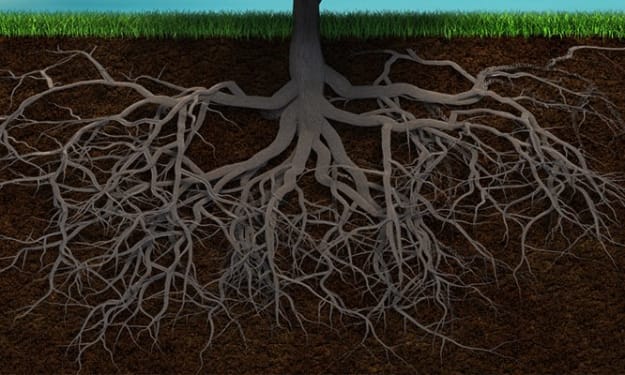Planting People
1st in a series about the psychology of growing people

This is about people, planting people. Growing plants turns out to be a lot like raising human beings, because in many ways they need the same things and have nuanced requirements. If these needs aren’t met the final product is affected immensely. Therefore, the fruit that is born of the tree is directly influenced by the circumstances present in the nascent period of its life. In layman’s terms, this applies to human beings in such a way as to imply that the mental, emotional and spiritual health of an adult human is directly impacted by the childhood and relationship with the caretakers. This overall health, or lack thereof, is then a direct influence of how said adult takes care of the next generation when they are a caretaker. So, the process repeats itself and the effects, if not healed become generational. A forest is full of trees, and the health of the forest is dependent upon the health and plentitude of factors such as soil, sun and water in a way where every tree can stand as an individual, but what effects one tree can affect the whole forest. So, you have this collective called a forest and individuals called trees, yet the whole and the sum parts are connected, the health of the trees becomes the health of the forest. I think you could say the same about a farm and its separate seeds and plants. I like to further this analogy to humanity and its societies, families and individuals. That’s why I’ve named this piece “Planting People.”
Every plant starts with a seed in which the final product is encoded into that seed. The seed already has the DNA that tells the roots to grow out, the stem to grow up, the leaves to turn green and the fruit to turn a certain color and have a certain shape. If that plant has flowers, then the color, shape and smell are all within that original design and the resources available to that seed will determine how much of that potential can manifest. Think of the seed of every plant in the same light as the human soul. I would profess that within each person’s soul is the blueprint for the highest potential of who they are to become in life, what that looks like and the attributes inherent in them that will assists them in coming to do what they were sent here to do and becoming who they are meant to become. Taking the world-renowned artist Picasso for example, his inherent artistic talents and desire to be immersed in and transform the world of painting were all encoded in his soul even before birth. The idea of this great artist, what that artist would look like and the attributes he possessed that would help or hinder his pursuit of greatness were all encoded within his soul, which was placed in the egg, which eventually was placed in the embryo. Thus, if you know that the seed being planted is a Picasso seed, then raising that seed to be an engineer isn’t going to be conducive to a happy Picasso nor likely a successful one.
Every seed is planted into some type of soil. The human seed is planted in the soil of the womb, from there it is launched into the family or community and then the larger social milieu. The soil consists of the environment around the seed that provides it the resources that it needs to grow and begin its matriculation through life. However, the healthiest plants need nutrient-laden soil that can provide what that seed needs to bloom into its healthiest version.
The Nutrients of the soil can translate as the resources of the surrounding entities existent in whatever milieu said seed is birthed into. Yet, I want to be clear that there are levels to this thing we call resources. Resources, as many will initially assume, can be monetary, yet they don’t end there. Resources can also be familial, emotional, intellectual and either spiritual or religious. When I say resources, I mean the plethora of things that can be utilized to alleviate or overcome life’s obstacles and stimulate growth. Not all souls coming into the earthly soil will receive the same amount in the same way. Some are born into environments that possess more monetary resources than others, while some lack the monetary resources yet have the others at their disposal. For some, money is all they have, for others they don’t possess any resources, period, and this of course affects the growth of the total person. Just as a seed planted into depleted soil receives less nutrients or resources to pull from on its way to maturation and this effects its ability to bloom and bear good fruit.
Another extremely important aspect to farming well is knowing your plants, which means having some knowledge of their individual traits and needs and how to best meet those needs—this requires understanding. Using an orchid as an example, in raising an orchid one must know that orchids need to be placed in the South or East facing window of the building so that it gets the right amount of sun in the morning and isn’t burned at high noon and gets only indirect sunlight. Providing for a person or plant in a way which maximizes the manifestation of their highest potential requires knowledge and understanding of that person or plant so that you can meet their needs sufficiently. Many people aren’t getting their needs met or are only getting the first level of human needs met because caretakers don’t know to meet them because they don’t know they exist. The law requires children to be provided with food, shelter, clothing, healthcare and education. Yet, I would posit that this is only the initial level that is the foundation for a hierarchy of needs, as most institutions such as jails, hospitals and orphanages will meet those requirements in order to keep you alive, yet what about the second level or the third? Can we expect a plant to grow if we only give it soil? Or depleted soil, at that? Putting a plant into a pot with dirt is just the first step, just as, I would argue, feeding, clothing, educating and providing healthcare to someone is the first step which provides for the functionality of the physical vehicle. Yet what about the psyche, mind, or even the soul? Are we wiser if we put a plant in the wrong place or in a place that isn’t appropriate for it and still expect it to grow, be happy and healthy? Can we sow Picasso seeds into depleted soil and then be surprised that they don’t bloom into the artists that we expect?
Of course, there are needs that I haven’t mentioned yet. I haven’t’ written a word about water, the one thing that is probably most crucial to the maturation of the plant. To me water is the one thing a plant can’t live without and can’t be duplicated artificially. Water is paramount to the plant’s survival, growth and health, therefore, in this analogy water will be love. The water of love must be poured in a sufficient amount on a consistent basis, otherwise your plant is threatened with peril. Water to a plant is like love to a human, many don’t know this, nor would they be willing to accept it, but without love the human psyche can’t develop to its maximum potential and is possibly the most important aspect that many humans are not getting enough of. So, this water of love must be given in the right amount at the right times, love and understanding come hand in hand, if you don’t understand another human being, you can’t love them. Can you give child what they need when you don’t know what they need?
The last need that must be given to our allegorical plant is the light of sun, which can be translated in human terms to the light of knowledge and the warmth of affirmation. Plants will not grow well in the dark, so neither will a human develop well draped in the darkness of ignorance. Knowledge explains the world and why it is the way it is and helps a child orientate itself regarding where it is and where it wants to go in life. Knowledge can come in the form of preparation for life and its obstacles, which in my mind is much like a soldier’s training. Training teaches one how to respond to life intelligently so that you are not doing things that “feel right” but are getting you further from your goal. The warmth of affirmation is crucial as well, being that it is the parents that reflect the child back to itself, this allows for the child to form a self-image of themselves. How the parent reflects, or reacts to the child will tell the child if they are accepted, annoying, whether they fit in well with the social order, or are they taught that they are difficult, and their opinions deemed unwanted or stupid even though the child’s observations are correct?
So much of the travesty in our world starts with soul seeds that are being planted in depleted soil, with water being withheld or poured in a stingy way and not getting enough sun, thus many are being grown in the dark. To add, many seeds go misunderstood and their farmers don’t know how to grow them, don’t know where the best place is to place them and instead, are pumping out plants as if they are on a factory line. Therefore, these factory plants that are malnourished and un-watered are being sent out into the world, yet we wonder why they aren’t blooming and are so dry with yellow leaves. Only those who know the language of plants can tell that they aren’t getting their needs met and thus aren’t able to meet the needs of others. Therefore, when it's their turn to take care of another seed, they will only do what was done for them. We must remember that the seeds we sow are directly linked to the fruit we eat, thus when it comes to our seeds, we really do reap what we sow. This is how we are planting people.
About the Creator
Robert Burton
A world traveler and student of life, people and the human mind. I've been molded by my origins in The American South, six years of life in The People's Republic of China and my passion for life. I live, I learn and then I write about it.






Comments
There are no comments for this story
Be the first to respond and start the conversation.